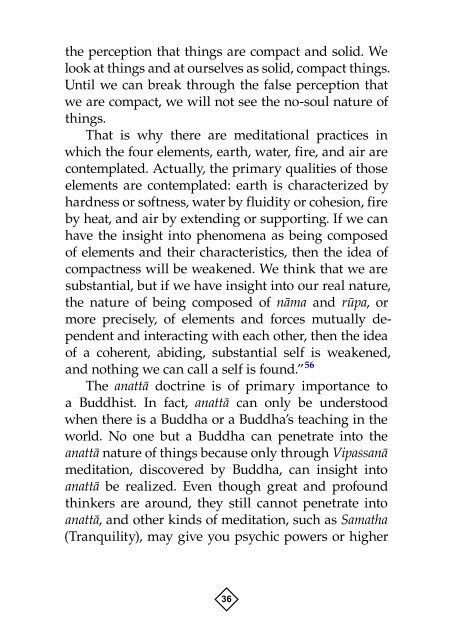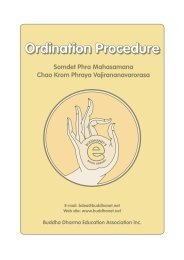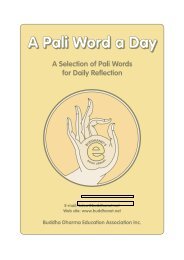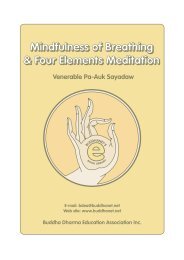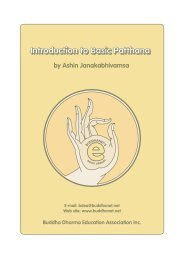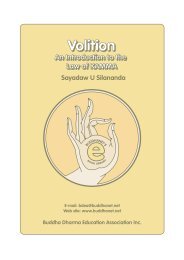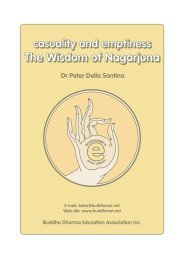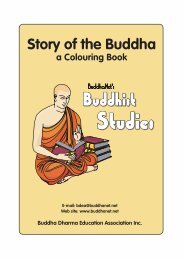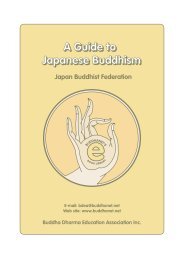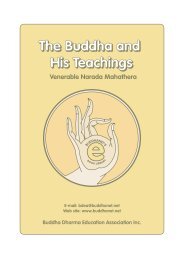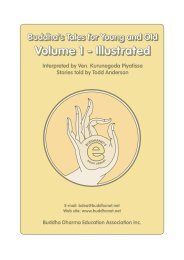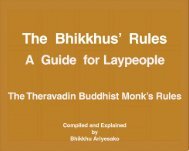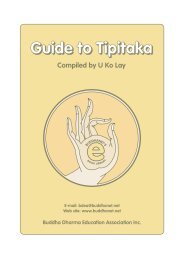No Inner Core: An Introduction to the Doctrine of Anatta - BuddhaNet
No Inner Core: An Introduction to the Doctrine of Anatta - BuddhaNet
No Inner Core: An Introduction to the Doctrine of Anatta - BuddhaNet
You also want an ePaper? Increase the reach of your titles
YUMPU automatically turns print PDFs into web optimized ePapers that Google loves.
<strong>the</strong> perception that things are compact and solid. We<br />
look at things and at ourselves as solid, compact things.<br />
Until we can break through <strong>the</strong> false perception that<br />
we are compact, we will not see <strong>the</strong> no-soul nature <strong>of</strong><br />
things.<br />
That is why <strong>the</strong>re are meditational practices in<br />
which <strong>the</strong> four elements, earth, water, fire, and air are<br />
contemplated. Actually, <strong>the</strong> primary qualities <strong>of</strong> those<br />
elements are contemplated: earth is characterized by<br />
hardness or s<strong>of</strong>tness, water by fluidity or cohesion, fire<br />
by heat, and air by extending or supporting. If we can<br />
have <strong>the</strong> insight in<strong>to</strong> phenomena as being composed<br />
<strong>of</strong> elements and <strong>the</strong>ir characteristics, <strong>the</strong>n <strong>the</strong> idea <strong>of</strong><br />
compactness will be weakened. We think that we are<br />
substantial, but if we have insight in<strong>to</strong> our real nature,<br />
<strong>the</strong> nature <strong>of</strong> being composed <strong>of</strong> nàma and råpa, or<br />
more precisely, <strong>of</strong> elements and forces mutually dependent<br />
and interacting with each o<strong>the</strong>r, <strong>the</strong>n <strong>the</strong> idea<br />
<strong>of</strong> a coherent, abiding, substantial self is weakened,<br />
and nothing we can call a self is found.” 56<br />
The anattà doctrine is <strong>of</strong> primary importance <strong>to</strong><br />
a Buddhist. In fact, anattà can only be unders<strong>to</strong>od<br />
when <strong>the</strong>re is a Buddha or a Buddha’s teaching in <strong>the</strong><br />
world. <strong>No</strong> one but a Buddha can penetrate in<strong>to</strong> <strong>the</strong><br />
anattà nature <strong>of</strong> things because only through Vipassanà<br />
meditation, discovered by Buddha, can insight in<strong>to</strong><br />
anattà be realized. Even though great and pr<strong>of</strong>ound<br />
thinkers are around, <strong>the</strong>y still cannot penetrate in<strong>to</strong><br />
anattà, and o<strong>the</strong>r kinds <strong>of</strong> meditation, such as Samatha<br />
(Tranquility), may give you psychic powers or higher<br />
36


